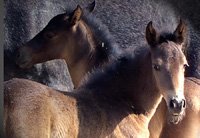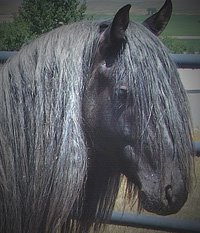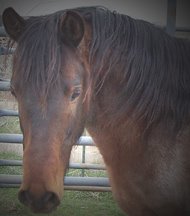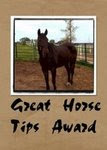Alas, I do not always get my way.
 By the end of the day following our 55-mile ride at Owyhee Canyonlands in September, two weeks after Aaruba finished his month-long course of GastroGard, I knew the ulcers were back. Aaruba's poor appetite and uncomfortable aspect led to a call to the vet, which led to another $500 GastroGard purchase and $100 in Doxycycline, in case the recurrence was due to an infected ulcer.
By the end of the day following our 55-mile ride at Owyhee Canyonlands in September, two weeks after Aaruba finished his month-long course of GastroGard, I knew the ulcers were back. Aaruba's poor appetite and uncomfortable aspect led to a call to the vet, which led to another $500 GastroGard purchase and $100 in Doxycycline, in case the recurrence was due to an infected ulcer.The antibiotic treatment went out the window after four doses. Poor Aaruba despised the stuff and lost every bit of appetite the GastroGard had so recently restored. So, I had to hope the GastroGard alone would do the trick…but what if it didn’t?
Time to do some homework.
Over the next couple weeks, I’ll provide a series of posts detailing the questions I asked and the answers I compiled from various resources both online and in print. My research focused particularly on gastric ulcers in endurance horses, which face some special concerns. Here are the questions I’ll address:
- What strategies can prevent equine gastric ulcer formation or recurrence?
- What medications and alternatives are available to combat equine gastric ulcers, and are there any problems associated with their long term use?
- How effective are ulcer preventative supplements, and are there any problems associated with their long term use?
- How do the costs and benefits of various supplements compare?
- What does the American Endurance Ride Conference say about ulcers and ulcer treatments in endurance horses?
- And finally, how will I apply this information for the benefit of my own herd?
Please remember that I’m neither vet nor expert. I'm just a bookish nerd who loves my horse but can’t afford a lifetime supply of GastroGard. Feel free to comment throughout the series with your own experiences or additional resources. I look forward to your insight. After all, gastric ulcers are extremely common in performance horses. It pays to be informed.
___________________________________________________
Related Posts
___________________________________________________
Related Posts
Strategies for Prevention of Equine Gastric Ulcer Syndrome
Pharmaceutical and Alternative Treatment Options for Equine Gastric Ulcer Syndrome
Equine Ulcer Supplement Options
EGUS, Endurance, and the AERC
A Fair Question: Equine Athletes, Equine Ulcers
Bringing it Home: EGUS Prevention at In the Night Farm
___________________________________________________Pharmaceutical and Alternative Treatment Options for Equine Gastric Ulcer Syndrome
Equine Ulcer Supplement Options
EGUS, Endurance, and the AERC
A Fair Question: Equine Athletes, Equine Ulcers
Bringing it Home: EGUS Prevention at In the Night Farm









8 comments:
After we did our series of ulcer treatments I saw "some" improvement but what really made the difference was adding Neigh Lox to his meals.
I give a 1/2 scoop 2x daily.
He cleans his bucket up and checks every one elses. He has always been a good hay eater.
I have also started including Omega Shine. In the last 6 months he has gained a much needed 75 pounds and has never looked better.
Neigh Lox is made by Kentucky Equine Research.
My vet is not a fan of the senior food for athletic horses. Not enough fat. I use a 10-10 blend that seems to be working well. I do bring senior feed to rides though if only to provide a different option. They seem to want somebody else's food when competing or something they don't usually get at home.
I hope this helps.
This is really going to be a great series Tamara. Looking forward to updates. Hope Aruba is better- and FAST!
Hi Tamara - sorry to hear that your horse is still having ulcer issues.
I just posted an article I wrote for EN in my blog: http://enduranceridestuff.com/blog/2008/10/preventing-equine-ulcers-for-endurance-riders/
You may find something useful in there - I know some of it may be dated since it's already 3 years old.
Good luck!
Gastric Ulcers in horses have been associated with our feeding regimes. They have been linked to our twice or three times a day feeding habits. Try an alternative such as the slow but continuous access bins you'll find in a thread on the SMR site. Contact Simrat, she can give you the direct link.
;)S
It is estimated that 80% and above of the equine species suffers from Gastric Ulcers do directly to our feeding habits.
Can't wait to read what you're putting together. Will link to it all, if that's ok.
Sandpony -- thanks for the comment on NeighLox; I've heard mixed reviews on that one (and all the others!) Good point about the Senior. My vet has advised Senior plus extra fat, like corn oil.
Mrs Mom -- Thanks :-) So far, so good on Aaruba...
Hi Karen -- Good article, and I appreciate the heads up on it; I'd missed that one. Aaruba is doing much, much better, and I'm implementing aggressive preventative strategies. All fingers crossed!
Susan -- Interesting about the continuous feeding bins. I wasn't aware of those. Thanks!
Kim (EH) -- Link away, and thanks much! :-)
Going through mild ulcers with my own, so I stumbled upon your blog within my research. ;)
Before I continue on with reading, I saw you mentioned corn oil--and recently, studies have shown that long term it can cause high inflammation to the large intestine, and to joints. Eek! Linseed oil causes colic, and at this point that's as far as I know.
Darn horses and feed being so complex.
Post a Comment